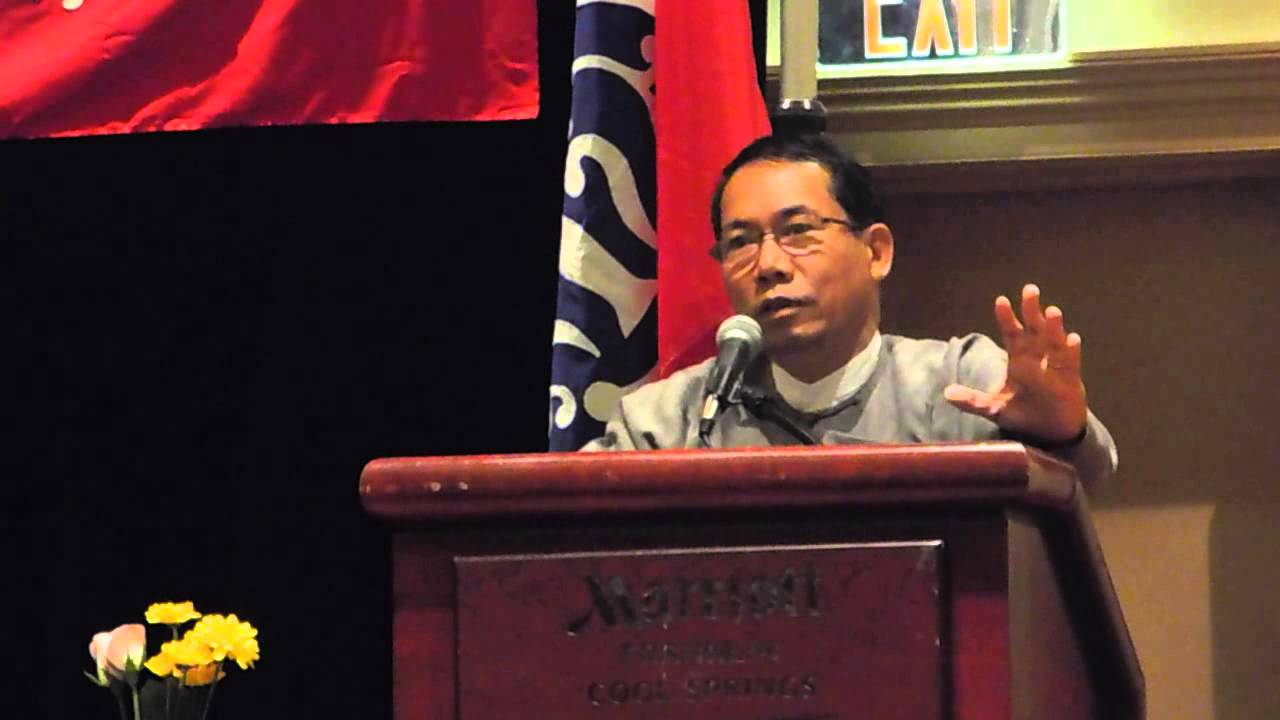Dr. Aye Maung was appointed chairman of the newly-formed Rakhine National Party (RNP) at the party’s first conference this week—an event that turned out to be controversial because several leading figures were sidelined from executive positions, including Aye Thar Aung, the former chairman of the Arakan League for Democracy (ALD).
The RNP, founded in June 2014, was created by a merger of the ALD and the Rakhine Nationalities Development Party, a party that Aye Maung previously led as president.
DVB spoke to Aye Maung on Wednesday following his appointment as RNP chairman. During the interview, Aye Maung discussed his political stance and the RNP’s new strategy. The new RNP chairman also addressed his views on the status of Rohingyas (or Bengalis) in Arakan State.
Q: We understand this was the first time a RNP congress was held by the two combined parties. Did the representatives from both sides engage in tactful discussion? How did it end?
A: We still have this matter to resolve. Since we are attempting to merge two parties that have their own unique frameworks there are several matters that need to be negotiated to ensure the combined RNP can cooperate, foster unity and create common policies that serve the country’s interests. In order to implement this merger we set a seven-month organising period after disbanding the former parties. The process is being supervised by two chairpersons who are tasked with designing a new party structure and common policies for the first congress. Throughout this seven-month period the two parties laid the groundwork for the new party through various forms of cooperation. In addition, we established an interim Central Committee with 45 people from each disbanded party and a Central Executive Committee (CEC) with 15 people from each party.
We tried discussing the organisational structure with regard to the CEC chairperson, deputy chairperson and secretary. However, since the old parties’ policies and ideologies are still influential, the RNDP turned out to be the stronger force in the new leadership structure, while the ALP’s share of responsibility is rather weak. The structure we proposed envisions a former RNDP member as chairperson and a former ALP member as deputy-chairperson, along with two secretary positions. Yet this approach didn’t work out, so we have to figure out how to proceed in the future on these issues.
Q: What are the main policies of the RNP?
A: We aim to work for the security of Arakan State and maintain peace and development in our region. This is highlighted in our manifesto. The full details will be discussed at an upcoming RNP central executive committee meeting and then submitted to the party’s central committee for approval.
Q: What will your party do to ensure there is no more religious or communal conflict in Arakan State?
A: We will mostly focus on expanding our party membership. In doing so, we will build a stable and peaceful environment. During this process, adherence to the Constitution is important. We are still trying to draft a constitution that comports with the expectations and desires of the people. We hope that all ethnic nationalities will be afforded the right of self-determination.
Q: The government is now working on a pilot project with regard to nationality verification. What is your party’s stance on this issue?
A: We insist on following the rule of law and the Constitution. Similarly, when abiding by the rule of law, we must enforce the 1982 Citizenship Act. We assume the nationality verification project will be implemented jointly by the Arakan State government and the Union government.
Those who qualify for citizenship should be granted it. Then, we must design a plan for the settlement of verified citizens in Arakan State. But the aim must always be to maintain the rule of law and promote security and development.
Q: Many observers around the world are interested in how you will handle the Bengali/Rohingya issue as the main political party in Arakan State. How would you respond to them?
A: First, we call Bengalis by their correct name: Bengalis. This is a historical fact. Second, I don’t want this ongoing problem to become a regional problem. There should be a thorough analysis of the current problem and a policy should be implemented to resolve the matter in a way that creates a stable and peaceful environment. The Bengali problem must be viewed in light of the 1982 citizenship law. Those who qualify as citizens should be given citizenship and freedom.
Similarly, for the sake of stability and peace in our state it’s important to develop a good policy for individuals who aren’t eligible for citizenship. To resolve this issue, an international policy should be jointly created and enforced by the international community, the Union government and foreign governments. This joint international policy should include protections for the indigenous Rakhine people in northern Arakan State and an effective means of addressing the high birth rate in Bangladesh.”
“Similarly, we need a policy to develop Arakan State’s economy. If we can successfully implement these two policies, Arakan State will be stable for both Rakhines as well as Bengalis, and we will be able to survive on our own without depending on international assistance.
In other words, regardless of whether the majority in northern Arakan State is Bengali or Rakhine we will be able to use manpower effectively and establishing economic zones or garment factories with the help of international investment.
Q: Al-Qaeda has announced its intention to target Burma. What is your position on this?
A: We don’t accept terrorism and we will not bow to any terror threat. We reject all extreme beliefs. To be frank, we need to create institutions in Burma to protect against religious extremism. We should also have security measures to ensure a stable and peaceful environment. In setting up these security measures, Burma should seek cooperation between international organisations and the Union government. It is also important to involve the public in these campaigns.



